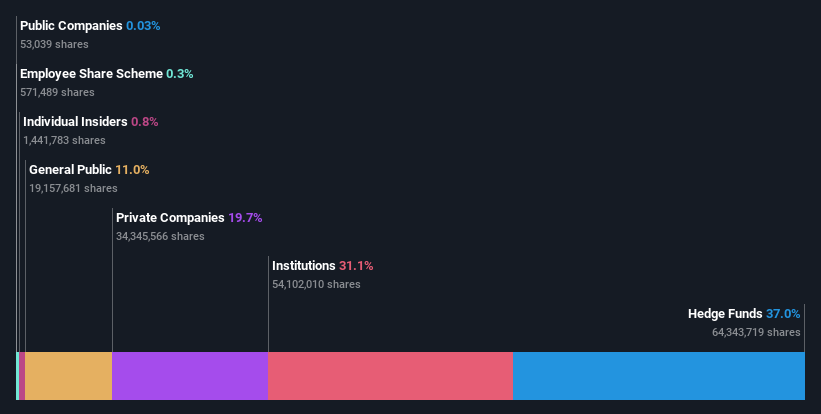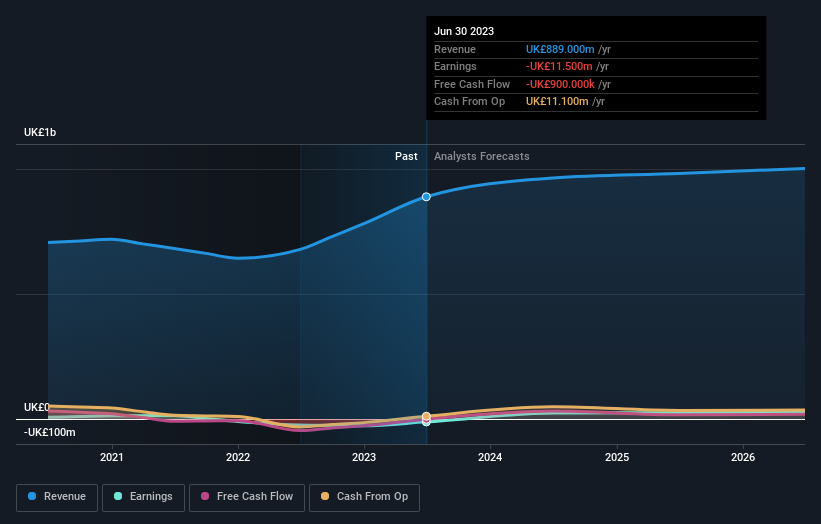Key Insights
-
Significantly high institutional ownership implies McBride’s stock price is sensitive to their trading actions
-
55% of the business is held by the top 3 shareholders
-
Past performance of a company along with ownership data serve to give a strong idea about prospects for a business
If you want to know who really controls McBride plc (LON:MCB), then you’ll have to look at the makeup of its share registry. With 37% stake, hedge funds possess the maximum shares in the company. Put another way, the group faces the maximum upside potential (or downside risk).
Since hedge funds have access to huge amounts of capital, their market moves tend to receive a lot of scrutiny by retail or individual investors. As a result, a sizeable amount of institutional money invested in a firm is generally viewed as a positive attribute.
Let’s take a closer look to see what the different types of shareholders can tell us about McBride.
See our latest analysis for McBride
What Does The Institutional Ownership Tell Us About McBride?
Many institutions measure their performance against an index that approximates the local market. So they usually pay more attention to companies that are included in major indices.
McBride already has institutions on the share registry. Indeed, they own a respectable stake in the company. This can indicate that the company has a certain degree of credibility in the investment community. However, it is best to be wary of relying on the supposed validation that comes with institutional investors. They too, get it wrong sometimes. It is not uncommon to see a big share price drop if two large institutional investors try to sell out of a stock at the same time. So it is worth checking the past earnings trajectory of McBride, (below). Of course, keep in mind that there are other factors to consider, too.
It would appear that 37% of McBride shares are controlled by hedge funds. That’s interesting, because hedge funds can be quite active and activist. Many look for medium term catalysts that will drive the share price higher. The company’s largest shareholder is Teleios Capital Partners LLC, with ownership of 25%. Dumac, LLC is the second largest shareholder owning 18% of common stock, and Zama Capital Advisors LP holds about 12% of the company stock.
After doing some more digging, we found that the top 3 shareholders collectively control more than half of the company’s shares, implying that they have considerable power to influence the company’s decisions.
While it makes sense to study institutional ownership data for a company, it also makes sense to study analyst sentiments to know which way the wind is blowing. There is some analyst coverage of the stock, but it could still become more well known, with time.
Insider Ownership Of McBride
The definition of an insider can differ slightly between different countries, but members of the board of directors always count. Company management run the business, but the CEO will answer to the board, even if he or she is a member of it.
Most consider insider ownership a positive because it can indicate the board is well aligned with other shareholders. However, on some occasions too much power is concentrated within this group.
Our data suggests that insiders own under 1% of McBride plc in their own names. But they may have an indirect interest through a corporate structure that we haven’t picked up on. It appears that the board holds about UK£1.0m worth of stock. This compares to a market capitalization of UK£123m. Many investors in smaller companies prefer to see the board more heavily invested. You can click here to see if those insiders have been buying or selling.
General Public Ownership
With a 11% ownership, the general public, mostly comprising of individual investors, have some degree of sway over McBride. This size of ownership, while considerable, may not be enough to change company policy if the decision is not in sync with other large shareholders.
Private Company Ownership
Our data indicates that Private Companies hold 20%, of the company’s shares. It’s hard to draw any conclusions from this fact alone, so its worth looking into who owns those private companies. Sometimes insiders or other related parties have an interest in shares in a public company through a separate private company.
Next Steps:
I find it very interesting to look at who exactly owns a company. But to truly gain insight, we need to consider other information, too. Like risks, for instance. Every company has them, and we’ve spotted 2 warning signs for McBride (of which 1 is a bit unpleasant!) you should know about.
If you are like me, you may want to think about whether this company will grow or shrink. Luckily, you can check this free report showing analyst forecasts for its future.
NB: Figures in this article are calculated using data from the last twelve months, which refer to the 12-month period ending on the last date of the month the financial statement is dated. This may not be consistent with full year annual report figures.
Have feedback on this article? Concerned about the content? Get in touch with us directly. Alternatively, email editorial-team (at) simplywallst.com.
This article by Simply Wall St is general in nature. We provide commentary based on historical data and analyst forecasts only using an unbiased methodology and our articles are not intended to be financial advice. It does not constitute a recommendation to buy or sell any stock, and does not take account of your objectives, or your financial situation. We aim to bring you long-term focused analysis driven by fundamental data. Note that our analysis may not factor in the latest price-sensitive company announcements or qualitative material. Simply Wall St has no position in any stocks mentioned.
















